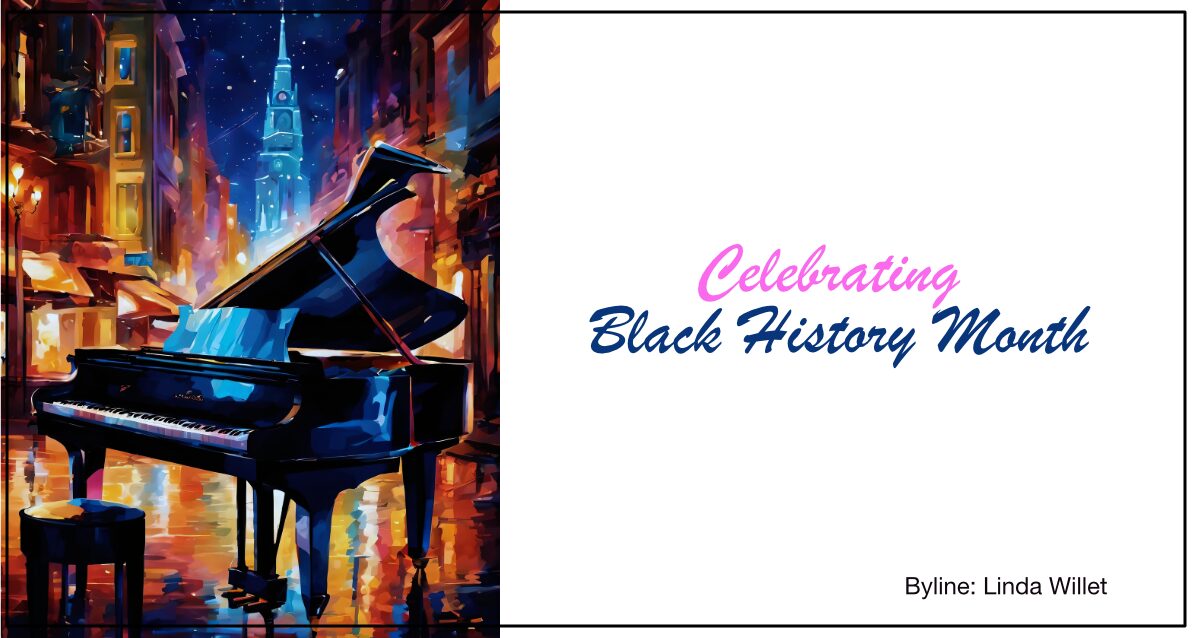It is ironic that Inauguration Day coincided with Martin Luther King, Jr. Day this year, but it does make us aware of the differences between President Elect Trump and Martin Luther King, Jr. As we reflect on those differences, we know which man is the real hero and defender of democracy: Dr. Martin Luther King, Jr., a humble man who advocated nonviolence even when he was beaten and his life was threatened. Therefore, those of us who did not celebrate the Inauguration can celebrate Black History Month in February and remember and celebrate the life of Dr. Martin Luther King, Jr., and the musicians and artists who participated in the Civil Rights Movement and fight for democracy.
Throughout the history of this country, courageous women have stepped up to speak out about injustice. Our previous biographies have told the stories of some of these women: Ida B. Wells, Fannie Lou Hamer, and Shirley Chisholm. In addition, there were artists who used their talent to advocate for equal rights for women, even when they were threatened by the public and government officials. Their artists came from different backgrounds, but they had one thing in common. They wanted to make life better for their people, and they knew that music could help them do it. From the early years of slavery and up through the present day, Black musicians have used songs to unite, inspire, and pass along messages. When you hear familiar songs such as “Let Us Break Bread Together,” “Michael, Row the Boat Ashore,” and “Swing Low, Sweet Chariot,” think about the words and how these songs were used over a hundred years ago by the Underground Railroad to pass along secret messages about escape. Today, these same songs might be used to unite people in protest or to inspire people to take some other action.

One of the early performers in the twentieth century was Billie Holiday, a blues/jazz singer who sang “Bitter Fruit,” a song about the lynching of Black men. The song was based on a poem written by Abel Meeropol, a descendant of Russian Jewish immigrants who was upset by systemic racism in America. He wrote “Bitter Fruit” after seeing a photo of two Black teenagers who were hanged in 1930. Even though Holiday was afraid of political backlash, she recorded the song in 1939. It became a “protest anthem” that radio stations in the South refused to play. When Holiday refused to stop singing it, the U.S. government persecuted her by sending agents to entrap her by selling drugs to her. She was sent to prison for over a year and lost her performer’s license. Look up the words of “Bitter Fruit” and think about how the words of this song angered officials of the U.S. government and caused them to persecute Holiday.
Mahalia Jackson, the granddaughter of enslaved people, never met Billie Holiday, but she continued Holiday’s tradition of singing for her people. Jackson was determined to deliver the message about God’s love through her songs. At a young age, Jackson left New Orleans and moved to Chicago where she sang with the Johnson Singers, a gospel group. In 1947, she released “Move On Up a Little Higher.” It became the #2 song on the Billboard charts and brought instant acclaim to Jackson. Jackson was a personal friend of Dr. King and his family and sang the protest song, “We Shall Overcome” at many civil rights rallies in the 1960s. When Dr. King was speaking at the March on Washington for Jobs and Freedom in 1963, Mahalia yelled out to him, “Tell ‘em about the dream, Martin,” and Martin modified his speech to deliver the famous “I Have a Dream” speech. Jackson is considered the “voice of the civil rights movement” and the “Queen of Gospel.” When Dr. King asked her to help, she never refused. Do you think the songs she sang put her in danger?

Aretha Franklin was friends with Mahalia Jackson and continued Mahalia’s fight for civil rights. When Franklin’s mother died, Mahalia and some other women in the community stepped in to mentor ten-year old Aretha. Franklin said that she learned to play the piano by ear when Jackson was taking care of her. Franklin’s father, C.L. Franklin, was a well-known minister who knew Dr. King and worked with him in the civil rights movement. Aretha often traveled with her father and sang with him at Black churches, civil rights events, and radio programs. In 1960, Aretha moved to New York and switched to singing secular music, but it was 1967 before she recorded the hit song “Respect,” which was written by Otis Redding. Aretha’s version of “Respect” became an anthem for the civil rights movement and earned her the title of “Queen of Soul.” Both Aretha and her father were under surveillance by the FBI for years, but they persisted in their mission to help their people.
The voices of these three women inspired other artists such as Joan Baez, who also sang at the March on Washington in 1963. Today, the fight for civil rights and equity continues, but these three women opened doors for the generations that followed them and passed along a legacy throughout the world. It’s the legacy of hard work and peaceful protest that Dr. Martin Luther King, Jr., advocated. King and these three women knew what the slaves in the 1800s knew: the power of music is stronger than any weapon because it embodies love, determination, and a message that will not back down.

Footnote: As mentioned throughout this article, the March on Washington in 1963 brought together 200,000 people to march in support of equity and fair labor. Artists who supported civil rights and also protested the Vietnam War joined with Dr. King at that time. Joan Baez, a well-known folk singer started the program by asking the crowd to sing “We Shall Overcome.” Mahalia Jackson performed next with two 19th century African American spirituals: “How I Got Over” and “I Been ‘Buked and I Been Scorned.” She then introduced Dr. King, who gave his famous “I Have a Dream” speech. Marian Anderson followed Dr. King by singing “He’s Got the Whole World in His Hands,” and Odetta came next with “I’m On My Way.” Near the end, Peter, Paul, and Mary sang “Blowin’ In the Wind” and “If I Had a Hammer.”
Bibliography
“Looking Back on the Music that Accompanied the March on Washington 60 Years Ago,” Scott Simon, keranews.org, August 26, 2023.
Do a search for the title above to pull up the article.
https://women’shistory.si.edu blog
Do a search for “Women Musicians Shined at the 1963 March on Washington for Jobs and Freedom,” Smithsonian American Women’s History Museum
Aretha Franklin
britannica.com
Search Brittanica for the name of each artist to see biographical info.
Kennedy Center
“Billie Holiday + Strange Fruit”
Search for Billie Holiday and “Strange Fruit” to pull up an article about Holiday with the song lyrics.
biography.com Type in this link with the name of each artist at the end to see biographical info.

